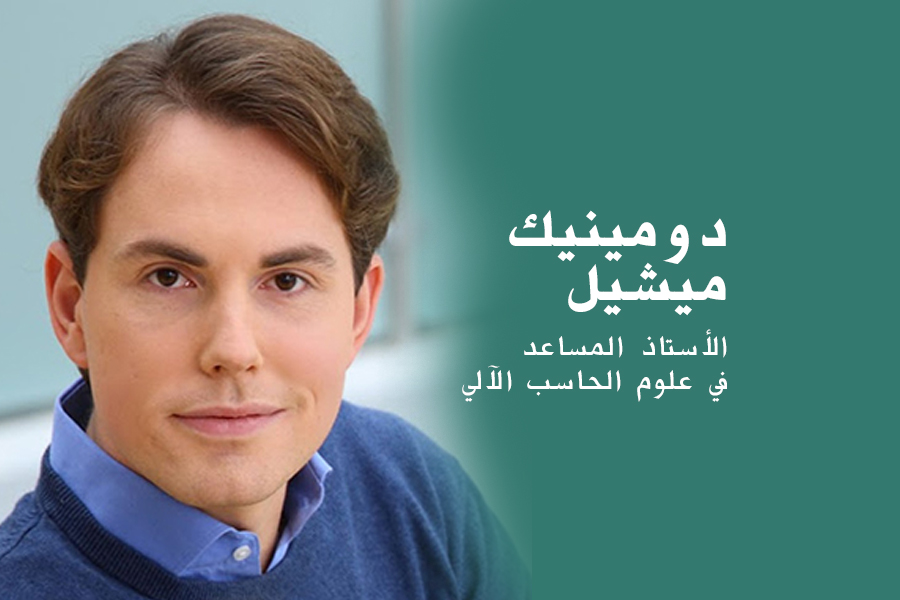Faculty Focus: Dominik Michels

Dominik Michels, assistant professor of computer science in the University's Computer, Electrical and Mathematical Science and Engineering Division.
Dominik Michels is a computer scientist and mathematician in the University’s Computer, Electrical and Mathematical Science and Engineering Division. Prior to joining KAUST, Michels lived, worked and studied in Germany, Russia and the U.S., including spending time at universities and research institutions such as Caltech, Harvard, the Joint Institute for Nuclear Research, NASA's Jet Propulsion Laboratory, Stanford and the University of Bonn.
His research at KAUST includes examining the fundamental and applied aspects of computational mathematics and physics and addressing open research questions in algorithmics, computer algebra, symbolic-numeric methods and mathematical modeling to solve practically relevant problems in scientific and visual computing.
“My research is centered on developing new algorithms capable of highly accurate and efficient computer simulations that are beneficial in different areas of science and engineering. I work at the intersection of computer science, mathematics, and physics, and I am fascinated by the ability to create fundamental algorithms and methods that can solve complicated real world problems,” he said. “Outside of my academic research, I am very active in technology transfer and doing a lot of work with different industry partners.”
Michels completed his bachelor’s degree in computer science and physics, his master’s degree in computer science and his Ph.D. in mathematics and natural sciences at the University of Bonn. He did his postdoctoral studies in computing and mathematical sciences at Caltech. In 2014, he became the youngest faculty member in Stanford’s computer science program, and later he became the youngest faculty member in the computer, electrical and mathematical science and engineering programs at KAUST.
On why he chose to come to KAUST, Michels responded, “I joined KAUST because it is one of just a select few universities that has the potential to create tremendous global impact in science and society. KAUST initiates educational, economic and social change in the region, and from a purely scientific perspective, KAUST addresses current global challenges, including energy and environmental issues.”
Michels also enjoys the international “work-live-play” environment that KAUST offers.
“I really like the international community here on campus because it implements a culture of diversity beyond pure numbers and statistics,” he said.
-By David Murphy, KAUST News.
Dominik Michels is a computer scientist and mathematician in the University’s Computer, Electrical and Mathematical Science and Engineering Division. Prior to joining KAUST, Michels lived, worked and studied in Germany, Russia and the U.S., including spending time at universities and research institutions such as Caltech, Harvard, the Joint Institute for Nuclear Research, NASA's Jet Propulsion Laboratory, Stanford and the University of Bonn.
His research at KAUST includes examining the fundamental and applied aspects of computational mathematics and physics and addressing open research questions in algorithmics, computer algebra, symbolic-numeric methods and mathematical modeling to solve practically relevant problems in scientific and visual computing.
“My research is centered on developing new algorithms capable of highly accurate and efficient computer simulations that are beneficial in different areas of science and engineering. I work at the intersection of computer science, mathematics, and physics, and I am fascinated by the ability to create fundamental algorithms and methods that can solve complicated real world problems,” he said. “Outside of my academic research, I am very active in technology transfer and doing a lot of work with different industry partners.”
Michels completed his bachelor’s degree in computer science and physics, his master’s degree in computer science and his Ph.D. in mathematics and natural sciences at the University of Bonn. He did his postdoctoral studies in computing and mathematical sciences at Caltech. In 2014, he became the youngest faculty member in Stanford’s computer science program, and later he became the youngest faculty member in the computer, electrical and mathematical science and engineering programs at KAUST.
On why he chose to come to KAUST, Michels responded, “I joined KAUST because it is one of just a select few universities that has the potential to create tremendous global impact in science and society. KAUST initiates educational, economic and social change in the region, and from a purely scientific perspective, KAUST addresses current global challenges, including energy and environmental issues.”
Michels also enjoys the international “work-live-play” environment that KAUST offers.
“I really like the international community here on campus because it implements a culture of diversity beyond pure numbers and statistics,” he said.
-By David Murphy, KAUST News.

